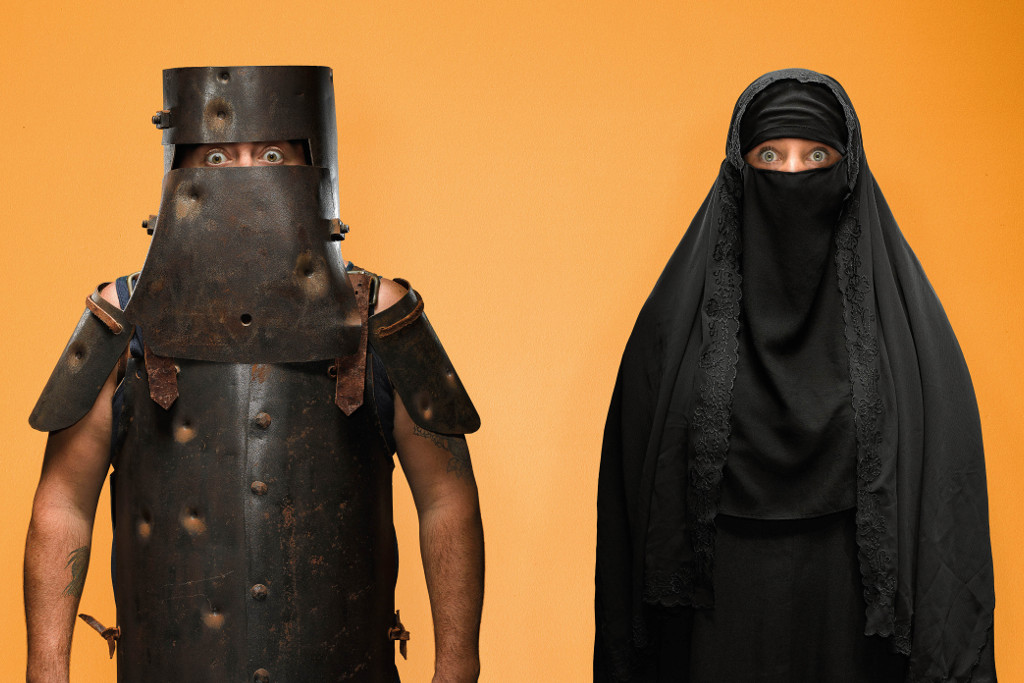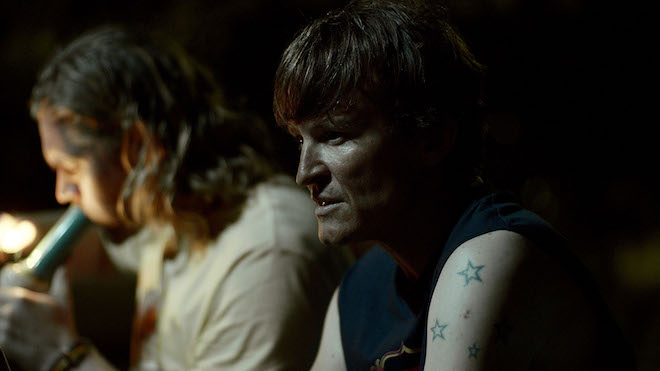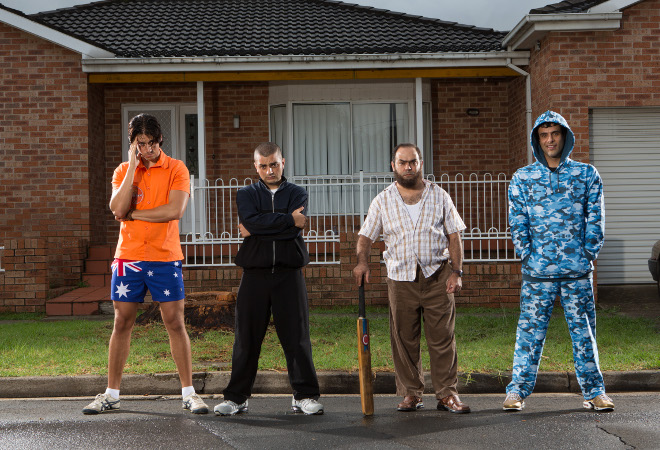‘Down Under’ Director Abe Forsythe On Racism, Comedy, And Inviting Pauline Hanson To The Movies
"By turning a blind eye, we're just as guilty as the people who are engaging in this behaviour."

What in God’s name would possess you to make a comedy about the Cronulla riots? To be honest, it’s not really something I thought I’d ever have to as. What filmmaker in their right mind would even try? And yet, as I start my interview with writer/director Abe Forsythe, it really is the most obvious place to start.
Forsythe is the man behind the newly released Down Under, a jet black Australian comedy that tackles ignorance and bigotry head on. Set in Sydney a day after the 2005 riots, the story tracks two groups of angry young men as they prowl the suburbs looking for a fight. On paper, it sounds like a trainwreck waiting to happen. In execution, it’s one of the best local films in years.
Of course a big part of what makes the movie so effective is the fact that it (sadly) feels so timely. Yes, the Cronulla riots took place more than a decade ago, but the racist attitudes that fuelled them appear to be as prevalent as ever. Just look at the rise of Reclaim Australia or the resurgence of Pauline Hanson — a person who Forsythe touches on a number of times during our conversation below.
–
Junkee: Like a lot of people, when I first heard that someone had made a comedy about the Cronulla riots, I assumed it was going to be a disaster. Where did the idea for the film first come from, and what made you think you could do it in a way that was funny?
Abe Forsythe: The idea came from finding out I was going to be a father, and realising that I really didn’t have that much time left to get a script written before [my son] was born. And then also finding out I was going to have a son raised all these questions about masculinity, and what kind of world I was bringing him into, and what he could get caught up in. That was what led me to the Cronulla riots.
I’d been experimenting with making short films that dealt with social issues in a comedic way, so it all just kind of fed into the one thing and then poured out of me after that.
The film manages to tackle a difficult subject in an extraordinarily funny way. Was it hard to find the right balance between the comedy and the more serious stuff?
Yeah, it was hard. It was one of those things that was only achieved through all the people we brought on to the film, from the crew to the cast… It would have just taken one of those key departments, or even one actor, and the whole thing could have fallen over.
I do think [the film] ended up being a lot darker than people were expecting, but that was out of what I felt was a responsibility to the subject matter. If you’re going to tackle this sort of story and these themes, you can’t glorify it, and if you don’t actually really ‘go there’, then you shouldn’t do it in the first place.
The darkness is actually something that I found to be really effective. Is it your hope that a comedy like this can generate serious discussion? Obviously the riots were a huge story when they happened, but it does now feel like it’s one of those things that we don’t really want to talk about.
Well yeah, that was the initial intent. When I wrote the script six years ago, it felt like we weren’t talking about what happened, and that we were brushing it aside. But it wasn’t the intention to be releasing the movie at this time, with everything that’s going on politically in this country… I feel like we’re just seeing a repeat of the same sort of stuff.
The riots started as a reaction to something that was happening locally, but it blew out into this much bigger, uglier thing. And similarly, recently we’ve seen someone come back into power politically, and they’re representing a percentage of the population that is scared. But it’s sort of like [that fear] starts to condone all this other behaviour.

From your perspective, it’s probably quite good timing, because the film feels so relevant to the political situation today. Do you feel like things in this country have gotten any better since the riots, or are we just going around in circles?
I don’t think it’s gotten better. I’m optimistic that it can get better. I think the one good thing about someone like Pauline Hanson coming back into power is that at least we’re talking about it, and at least it opens up the conversation. That’s what we need to be doing. We need to be talking, and we need to be listening to what everyone is saying, so we can find some way of not letting what happened ten years ago happen again.
Is there a particular target audience for the film?
It was always the intention to use the comedy as a way to make the film play broad. The whole point was to make some big, broad, stereotypical comic characters which we’re kind of familiar with in Australian comedy, but to then surprise the audience with the layers that are going on underneath. So, for that reason, I’m hoping that [the film] can play to a more mainstream audience that likes that kind of comedy, and that it can also play to a more discerning arthouse audience that appreciates the other side of it, and that there’s some way that we can make those two groups of people meet in the middle. That’s kind of what we’re trying to do with the story as well — to make people recognise that there’s no point in being divided.
With the film having played mostly to festival audiences so far, have you had much of a chance to gauge the reaction from a more mainstream crowd? Or even from people in Cronulla?
I’ve been doing Q&A screenings around the country at specific cinemas, where it’s been well-received. I don’t know how it’s going to [be received] in Cronulla. It is going to play in Cronulla, at the Event Cinema there, and we’re also doing a lot of key suburban screenings in Bankstown and Auburn. I think it’s going to play well there.
We recently released the first four minutes of the film, and that has been driving hundreds of thousands of people to our Facebook page. Interestingly, the majority of people who are tagging their friends are Middle Eastern and Asian. I think maybe, more than anyone, they probably need a little bit of a stress release from this kind of behaviour, and this film probably offers that.

What about the reaction from potential distributors?
Well Studio Canal is distributing our movie, but we’ve had a very, very mixed reaction from exhibitors. Some key exhibitors have given us really good support. [They] see the film for what it is and are embracing it. But then also we have exhibitors who say that this film should never have been made, and that there’s no audience for it, and that it’s morally reprehensible. But I know that some people can’t see the difference between a movie that has reprehensible behaviour in it and one that endorses it. So that’s been a challenge; having key exhibitors say there is no audience for the film. But especially after we released those first four minutes, we’re seeing hundreds of thousands of people coming in and saying they want to see it.
What we’re really trying to do is reward the exhibitors that have taken it on, and drive people into cinemas in the first week of release. We’re really pushing that hard, because if that happens then [other exhibitors] have to listen, and then it can grow from there.
Getting back to Pauline Hanson, I read that you’ve extended an invitation to her to come and see the film. Have you heard anything from her yet?
No, I haven’t heard anything. I’m sure she’ll get back to us. [Laughs]
Maybe she can bring her Halal snack pack?
Quite seriously, I would love her to see it. In the same way that when she was on Q&A, and that lovely Middle Eastern man invited her to his place for a meal, we all need to be opening ourselves up to the perceived “other side” of things, and opening ourselves up to experiences, because that’s the only way we’re going to learn how to move forward.
For me, making this movie and tackling this subject matter, I was exposing myself to all sorts of stuff that I wasn’t aware of. [Things that] people face day-to-day in this country, that the rest of us can turn a blind eye to because it’s not happening directly to us. But by turning a blind eye, we’re just as guilty as the people who are engaging in that behaviour.
–
Down Under is in cinemas now. Read our full review of the film here.
–
Tom Clift is Junkee’s weekend editor. He is also the co-founder of Movie Mezzanine, a film critic for ABC Overnights and tweets sporadically at @tom_clift.